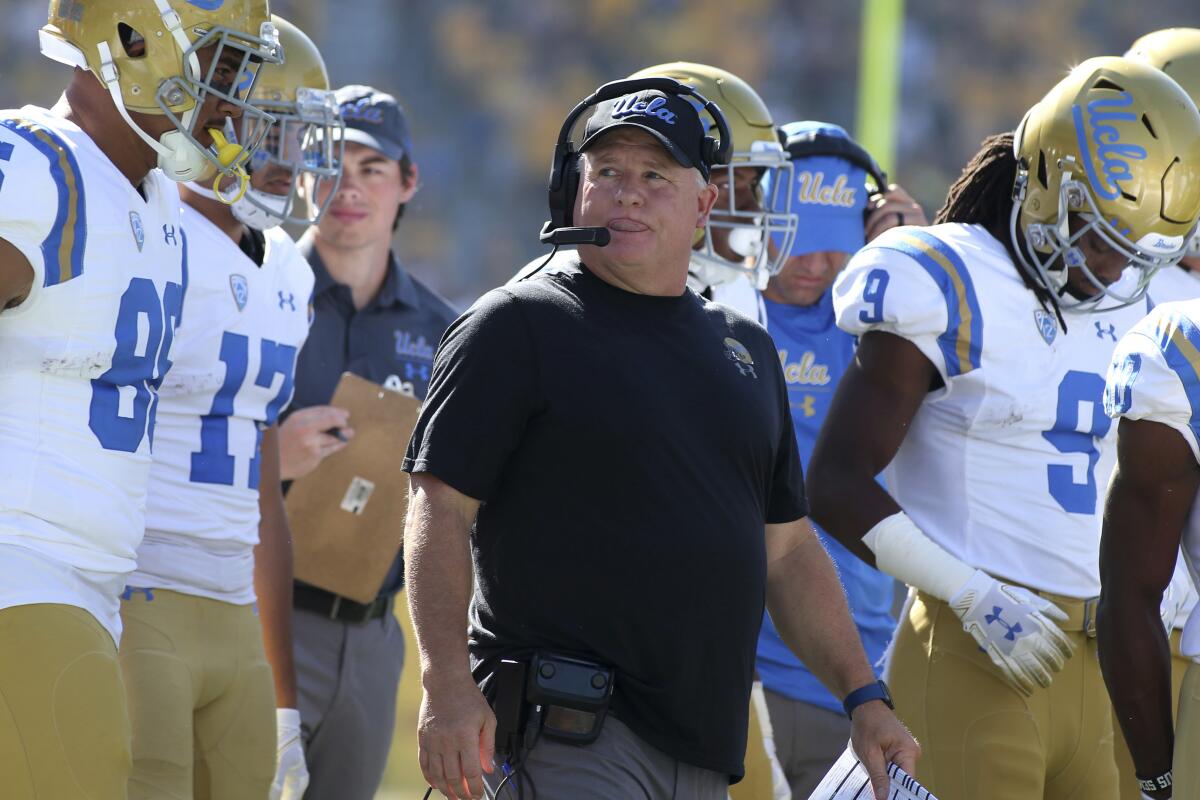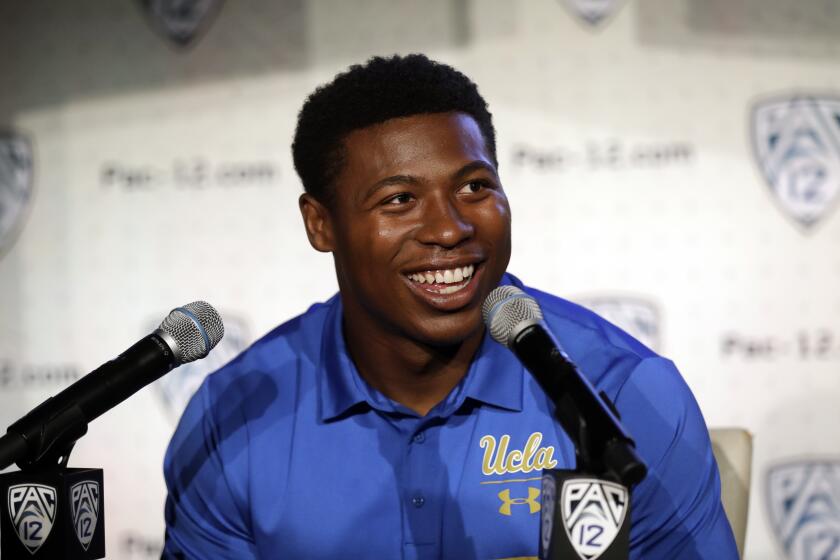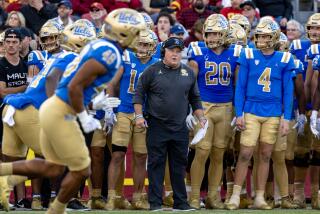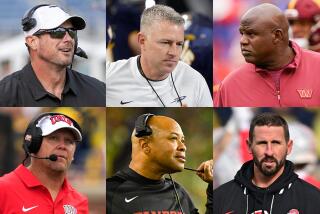Former UCLA players criticize coach Chip Kelly’s treatment of African Americans

- Share via
A tweet from UCLA football coach Chip Kelly about the social unrest that has gripped the nation over the last week sparked a rebuke from two former Bruins players who criticized the way Kelly treated African Americans on his team.
Kelly did not mention George Floyd, the African American man who died May 25 after a Minneapolis police officer knelt on his neck as he was handcuffed and on the ground, saying he couldn’t breathe and pleading for help. Instead, the coach referred to the fallout that has included nationwide protests that have turned violent in some instances.
“It’s hard to see our community — and humanity — so deeply hurting,” Kelly wrote. “The pain is felt by everyone in our Bruin family. In a time of such tragic destruction, we have been trying to understand how to best offer support to our players.”
Kelly went on to quote the late Rev. Martin Luther King Jr. about the need to “organize and unite people so that their anger becomes a transforming force.” The coach concluded his tweet by writing that “we must listen to each other, and learn from each other, and realize that all of us are connected to the sorrow and suffering and anger. We must unite, it is our only hope, and the first steps must be taken now.”
Stephen Johnson III, a former Bruins receiver who played for Kelly during the 2018 season before leaving the team with one season of remaining eligibility, retweeted Kelly’s message while adding: “What does this mean?” Replying to another tweet, Johnson wrote, “Let’s let the truth be known he threw away classes of black atheletes [sic] careers and did not care.”
More than 70 football players, comprising a mix of races, have left UCLA with remaining eligibility since Kelly’s arrival at the school. Many transferred while some medically retired and a handful turned professional, among other reasons for the departures.
Kelly declined to comment on the disparaging tweets when reached through a school spokesperson.
Bolu Olorunfunmi, a former running back whom the UCLA medical staff barred from participating in the final games of his senior season in 2018 after repeated concussions, also condemned Kelly’s message with a long thread of thoughts on social media.
“But what are YOU going to do???” Olorunfumi wrote in response to Kelly. “How is UCLA gonna be different and take that first step you are talking about?? I’m sorry mlk [sic] tweets don’t cut it! In a time like this those young men look for guidance! I know I never got it. That’s step 1: CARE…REAL CARE.”
Olorunfunmi also wrote that he was never allowed to have a voice as part of the program under Kelly, being told “I’m doing too much” or “you won’t play.”
“I’m saying this because no one controls me, no one can tell me [I’m] a ‘victim,’ ” Olorunfunmi wrote. “I have strong convictions and ucla FB need to do better with its minority Students Athletes!!! … All these ncaa programs with white men at the face of it have the lives of so many minority young men behind it need to do MORE!”
Olorunfunmi declined to elaborate on his tweets when reached later via direct message on Twitter.
The Chargers need running back production and are likely to get it from Joshua Kelley, a rookie out of UCLA with vision, speed and cutting ability.
Some African American players have praised Kelly’s impact on their lives, with cornerback Darnay Holmes recently telling the New York Post that the coach was “a great father figure of mine.”
Kelly reached out to school administrators over the weekend to seek flexibility on rules that restrict team activities during this part of the spring quarter so that he could virtually bring his players together to discuss the recent discord that has resulted in protests. The team did so through position meetings held online Sunday.
Kelly’s measured tweet diverged sharply from the impassioned words of UCLA track and field and cross-country coach Avery Anderson, a former Bruins athlete and son of a police officer who recalled his anger upon the Rodney King beating in 1992.
“At 19, pissed off at the police, I could’ve gone in the direction my rage and anger would’ve taken me,” Anderson wrote in an open letter. “I wanted to fight but I didn’t know who and I didn’t know how. I’ve learned that for me personally the hardest part in these moments is not knowing what to do with the pain and anger. I know many of you are in that exact place right now. I was fortunate enough to proceed down a path where I came to know that to channel the anger and rage I feel and turn that into positive action is the way to win.
“ ... Personally, I want change because I love my fellow humans. It’s because I love my fellow humans that I take action on racial inequality, gender equality, gun violence, homelessness and so on. Because I love you I don’t want to see anyone senselessly killed by the police for no good reason. So the starting point on my road map to make change starts with Love.”
Kelly has found himself in the midst of racial controversy before while coaching the NFL’s Philadelphia Eagles after he cut star receiver DeSean Jackson and traded productive running back LeSean McCoy, who were both African American.
“You see how fast he got rid of all the good players,” McCoy told ESPN the Magazine in 2015. “Especially all the good black players.”
But others countered that Kelly was only making moves that he thought would improve the team, noting that he also traded white quarterback Nick Foles while signing several players and a draft class that were predominantly African American. Kelly also won supporters as coach of the San Francisco 49ers after backing Colin Kaepernick during the controversy that erupted when the quarterback knelt during the national anthem to protest racial injustice.
More to Read
Go beyond the scoreboard
Get the latest on L.A.'s teams in the daily Sports Report newsletter.
You may occasionally receive promotional content from the Los Angeles Times.








